人教版七年级下册英语总复习资料
人教版七年级英语下册各知识点归纳总结
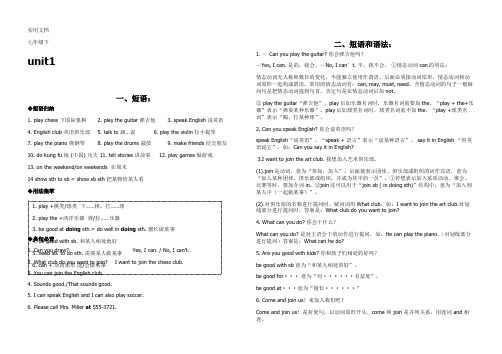
七年级下unit1一、短语:◆短语归纳1. play chess 下国际象棋2. play the guitar 弹吉他3. speak English 说英语4. English club 英语俱乐部5. talk to 跟…说6. play the violin 拉小提琴7. play the piano 弹钢琴8. play the drums 敲鼓9. make friends 结交朋友10. do kung fu 练 (中国) 功夫 11. tell stories 讲故事 12. play games 做游戏13. on the weekend/on weekends 在周末14 show sth to sb = show sb sth 把某物给某人看◆用法集萃◆典句必背1. Can you draw? Yes, I can. / No, I can’t.2. What club do you want to join? I want to join the chess club.3. You can join the English club.4. Sounds good./That sounds good.5. I can speak English and I can also play soccer.6. Please call Mrs. Miller at 555-3721.二、短语和语法:1. — Can you play the guitar? 你会弹吉他吗?—Yes, I can. 是的,我会。
—No, I can’t. 不,我不会。
①情态动词can的用法:情态动词无人称和数目的变化,不能独立使用作谓语,后面必须接动词原形,情态动词和动词原形一起构成谓语。
常用的情态动词有:can, may, must, need。
含情态动词的句子一般疑问句是把情态动词提到句首,否定句是在情态动词后加not。
新版人教版七年级英语下册期末总复习资料
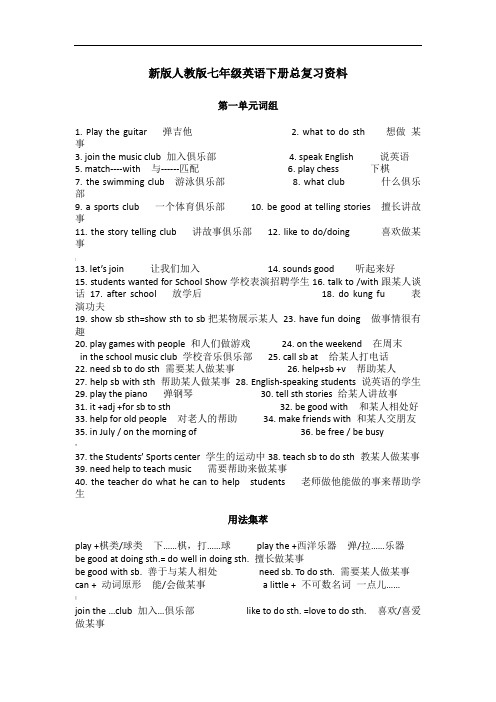
新版人教版七年级英语下册总复习资料第一单元词组1. Play the guitar 弹吉他2. what to do sth 想做某事3. join the music club 加入俱乐部4. speak English 说英语5. match----with 与------匹配6. play chess 下棋7. the swimming club 游泳俱乐部8. what club 什么俱乐部9. a sports club 一个体育俱乐部10. be good at telling stories 擅长讲故事11. the story telling club 讲故事俱乐部12. like to do/doing 喜欢做某事;13. let’s join 让我们加入14. sounds good 听起来好15. students wanted for School Show学校表演招聘学生16. talk to /with跟某人谈话17. after school 放学后18. do kung fu 表演功夫19. show sb sth=show sth to sb把某物展示某人23. have fun doing 做事情很有趣20. play games with people 和人们做游戏24. on the weekend 在周末in the school music club 学校音乐俱乐部25. call sb at 给某人打电话22. need sb to do sth 需要某人做某事26. help+sb +v 帮助某人27. help sb with sth 帮助某人做某事28. English-speaking students 说英语的学生29. play the piano 弹钢琴30. tell sth stories 给某人讲故事31. it +adj +for sb to sth 32. be good with 和某人相处好33. help for old people 对老人的帮助34. make friends with 和某人交朋友35. in July / on the morning of 36. be free / be busy*37. the Stud ents’ Sports center 学生的运动中38. teach sb to do sth 教某人做某事39. need help to teach music 需要帮助来做某事40. the teacher do what he can to help students 老师做他能做的事来帮助学生用法集萃play +棋类/球类下……棋,打……球play the +西洋乐器弹/拉……乐器be good at doing sth.= do well in doing sth. 擅长做某事be good with sb. 善于与某人相处need sb. To do sth. 需要某人做某事can + 动词原形能/会做某事 a little + 不可数名词一点儿……|join the …club 加入…俱乐部like to do sth. =love to do sth. 喜欢/喜爱做某事典句必背Can you draw Yes, I can. / No, I can’t.What club do you want to join I want to join the chess club.You can join the English club. Sounds good.I can speak English and I can also play soccer. Please call Mrs. Miller at 555-3721.<第二单元词组1. go to school 去上学2. get up 起床3. get dressed 穿衣服4. brush teeth 刷牙5. eat breakfast 吃早饭6. take a shower 洗澡7. what time 什么时间8. at six thirty 在六点半9. an interesting job 一个有趣的工作10. at the radio station 在广播电视台、11. always /usually/ often/ sometimes/ never 12. your radio show 你的广播节目13. from ----to 从哪里到哪里14. at night 在夜晚15. a funny time 一个有趣的时间16. take exercise 锻炼17. be late for 迟到18. at about ten twenty 在大约十点二十19. on weekends 在周末20. on school days 在上学日21. half past six 六点半22. a quarter past three 三点过一刻23. a quarter to seven 七点差一刻24. do homework 做家庭作业25. take a walk 散步26. have much time 有许多时间27. half an hour 半个小时28. get home 到达家29. either-----or 或者----或者30. eat a good breakfast 吃一顿快餐31. lots of /a lot of 许多32. be good for 对------有益…33. taste good 尝起来好34. do her homework 做她的家庭作业35. have a healthy life 有一个健康的生活方式用法集萃at + 具体时间点在几点(几分)eat breakfast/ lunch/dinner吃早饭/午饭/晚饭thirty\half past +基数词……点半fifteen\a quarter to +基数词差一刻到……点from …to … 从……到…… need to do sth 需要做某事典句必背、1. What time do you usually get up I usually get up at six thirty.2. That’s a funny time for breakfast.3. When do students uasually eat dinner They usually eat dinner at a quarter to seven in the evening.4. In the evening, I either watch TV or play computer games.5. At twelve,she eats lots of fruit and vegetables for lunch..6. She knows it’s not good for her, but it tastes good.7. Here are your clothes.佳作赏析'主题:谈论日常作息习惯My School DayI am a student. I usually get up at seven, and I eat breakfast at seven thirty. Then I go to school at eight. School starts at eight thirty. I eat lunch at taelve. I go home at 17:00. I often eat dinner at 19:00 and then play the piano. I do my homework at 20:00. At 22:00, I go to bed.第三单元词组1. get to school 到达学校2. take the train 乘火车3. take the subway 乘地铁4. ride a bike 骑自行车5. how do you get to school 怎么到达学校6. one hundred and five 1057. how far is it 多远8. how long does it take sb to do sth花费某人多长时间做某事9. ten minutes-----how long 10. ten minutes’ walk -------how far%11. ride the bike to school 骑自行车到学校12. every day 每天13. walk to , drive to ,fly to 14. I’m not sure我不敢确信15. about= around 大约16. 10 kilometers away from 十公里远17. good exercise 好的锻炼18. walk to school 步行去学19. get home 到达家20. drive his car to work 开车去上班21. in his father’s car 坐父亲的车25. crossing the river is 穿过河是22. need about 10 minutes to get to school 需要十分钟的时间到达学校23. I want to know where Bob lives我想知道鲍勃住到哪|24. what do you think of =how do you like 你觉得怎么样26. it is easy to get to school=it’s+ adj. +for sb. to do sth. 到达学校很容易27. there is 就近原则28. between----and 在两者之间29. no= not any =not a 30. the river run quickly 河水流的快动作上fast 速度上soon时间上32. on a ropeway 在索道上33. go on a ropeway to cross the river 坐索道穿过河37. love to do 喜欢做某事34. an 11-year-old boy一个11岁大的男孩35. ten minutes’ walk / a ten-minute walk 10分钟的路39. leave for . 离开到某地36. be afraid to do, be afraid of sth / doing害怕做某事41. come true 实现38. be like a father to me 像父亲一样做某事43. why ------because 40. leave sth at/ on /in +地点把某物留在某地42. why not +v原形;44. thanks for +n /doing sth为什么而感谢45. how to do it 怎么来做它46. at about 8:00 在大约8点用法集萃take… to …= go to … by… 乘…去…How do / does (sb)get to … …是怎样到…的How far is it from … to … 从…到…有多远It takes sb. some time to do sth. 做某事花费某人多长时间。
人教版七年级英语下册总复习资料
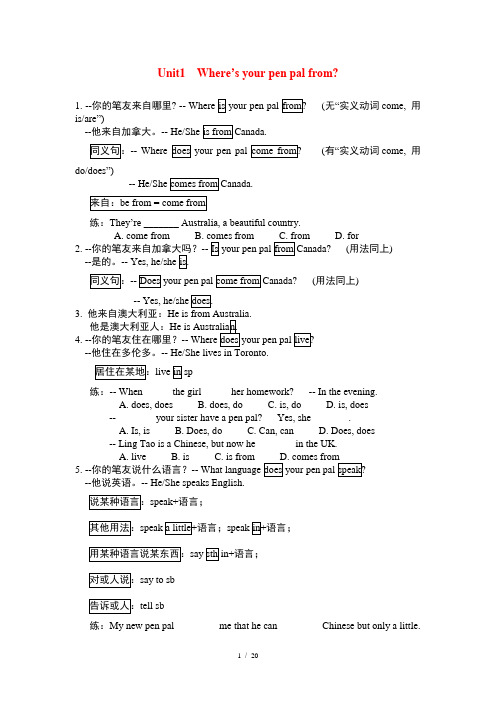
Unit1 Where’s your pen pal from?1. --你的笔友来自哪里(无“实义动词come, 用is/are”)--他来自加拿大。
-- your pen (有“实义动词come, 用do/does”)练:They’re _______ Australia, a beautiful country.A. come from D. for2. --(用法同上)--是的。
(用法同上)3. 他来自澳大利亚:他是澳大利亚人:4. --你的笔友住在哪里?--他住在多伦多。
练:-- When _____ the girl _____ her homework? -- In the evening.A. does, doesB. does, doC. is, doD. is, does-- _______ your sister have a pen pal? Yes, she _______.A. Is, isB. Does, doC. Can, canD. Does, does-- Ling Tao is a Chinese, but now he _______ in the UK.A. liveB. isC. is from5. --你的笔友说什么语言?--他说英语。
-- He/She speaks English.speak+语言;语言;语言;语言;say to sbtell sb练:My new pen pal ________ me that he can ________ Chinese but only a little.6. 我喜欢和我的伴侣一起去看电影:①②go to the movies③see a movie7. 写信给或人:互相写信:write e-mails to each other8.9.10.11.(1) 信:letter 一点:little(2) 法国:France 法语:12. (1) like v. 喜欢;如:(2) like prep. 像;如:13. (1) country n. 国家;如:(2) country n.14. (1) from perp. 来自;如:(2) from prep. 从;如:Unit2 Where’s the post office?1. 问路:(1) Excuse me, how can I get to the post office?2. --这儿附近有一个邮局吗?--是的。
人教版七年级下册英语总复习
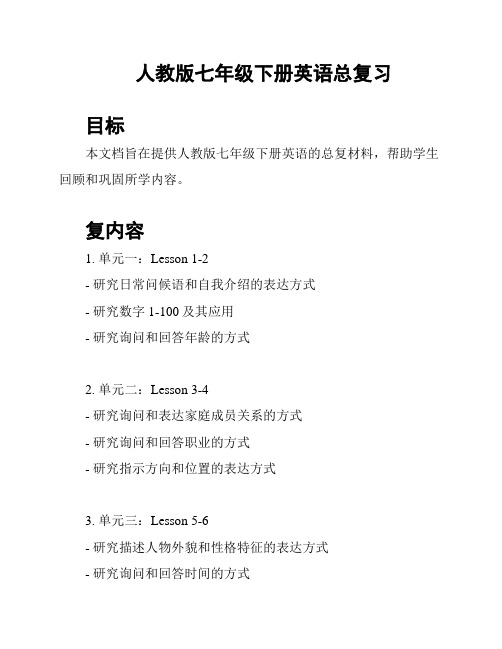
人教版七年级下册英语总复习
目标
本文档旨在提供人教版七年级下册英语的总复材料,帮助学生回顾和巩固所学内容。
复内容
1. 单元一:Lesson 1-2
- 研究日常问候语和自我介绍的表达方式
- 研究数字1-100及其应用
- 研究询问和回答年龄的方式
2. 单元二:Lesson 3-4
- 研究询问和表达家庭成员关系的方式
- 研究询问和回答职业的方式
- 研究指示方向和位置的表达方式
3. 单元三:Lesson 5-6
- 研究描述人物外貌和性格特征的表达方式
- 研究询问和回答时间的方式
- 研究表示频率的副词及其应用
4. 单元四:Lesson 7-8
- 研究描述人物喜好和日常活动的表达方式- 研究询问和回答能力和兴趣的方式
- 研究表达原因和结果的连词及其应用
5. 单元五:Lesson 9-10
- 研究描述家庭、房间和城市的表达方式- 研究询问和表达地点的方式
- 研究表示数量和价格的词汇及其应用
6. 单元六:Lesson 11-12
- 研究询问和回答日程安排的方式
- 研究表达喜怒和感受的形容词及其应用- 研究询问和表达能力和意愿的方式
复建议
- 复每个单元的重点词汇和常用句型
- 做相关单元的练题和听力练
- 跟读课文,注意语音和语调的准确性
- 制作复笔记,总结重点内容和常见问题- 参加口语练和模拟对话
祝愿同学们复习顺利,考试取得好成绩!。
人教版七年级英语下册总复习知识点考点总结归纳
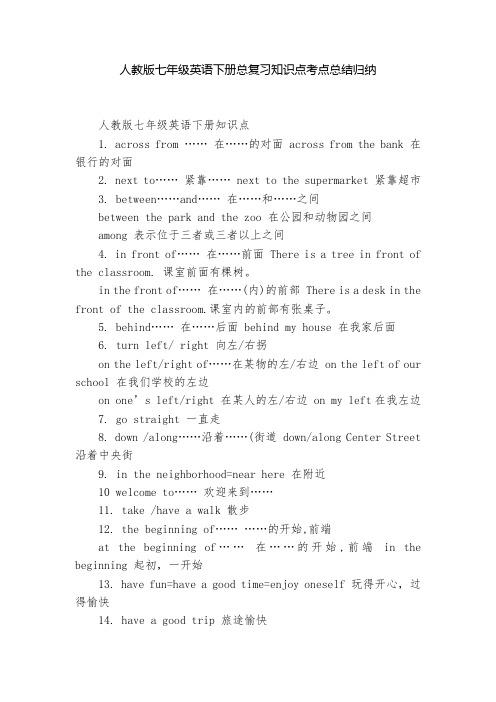
人教版七年级英语下册总复习知识点考点总结归纳人教版七年级英语下册知识点1. across from ……在……的对面 across from the bank 在银行的对面2. next to……紧靠…… next to the supermarket 紧靠超市3. between……and……在……和……之间between the park and the zoo 在公园和动物园之间among 表示位于三者或三者以上之间4. in front of……在……前面 There is a tree in front of the classroom. 课室前面有棵树。
in the front of……在……(内)的前部 There is a desk in the front of the classroom.课室内的前部有张桌子。
5. behind……在……后面 behind my house 在我家后面6. turn left/ right 向左/右拐on the left/right of……在某物的左/右边 on the left of our school 在我们学校的左边on one’s left/right 在某人的左/右边 on my left在我左边7. go straight 一直走8. down /along……沿着……(街道 down/along Center Street 沿着中央街9. in the neighborhood=near here 在附近10 welcome to……欢迎来到……11. take /have a walk 散步12. the beginning of…………的开始,前端at the beginning of……在……的开始,前端in the beginning 起初,一开始13. have fun=have a good time=enjoy oneself 玩得开心,过得愉快14. have a good trip 旅途愉快15. take a taxi 坐出租车16. 到达:get to +地方get here/ there/ home 到这/那/家 arrive in +大地方 I arrive in Beijing. arrive at +小地方I arrive at the bank. reach +地方17.go across 从物体表面横过 go across the street横过马路go through 从空间穿过 go through the forest穿过树林18.on + 街道的名称。
人教版人教版七年级下册英语知识点复习(完整版)
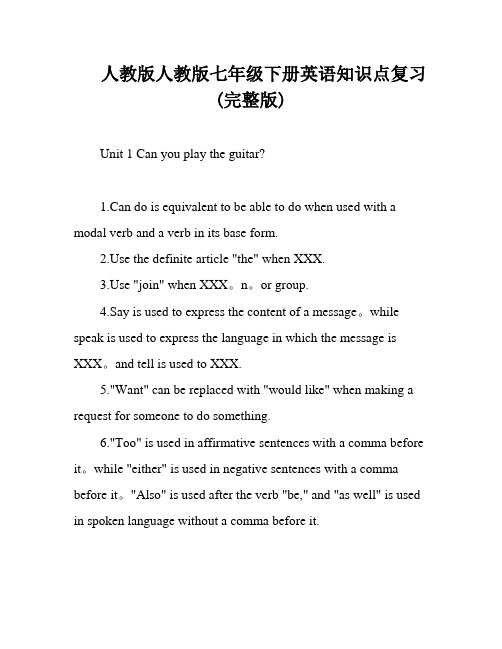
人教版人教版七年级下册英语知识点复习(完整版)Unit 1 Can you play the guitar?1.Can do is equivalent to be able to do when used with a modal verb and a verb in its base form.e the definite article "the" when XXX.e "join" when XXX。
n。
or group.4.Say is used to express the content of a message。
while speak is used to express the language in which the message is XXX。
and tell is used to XXX.5."Want" can be replaced with "would like" when making a request for someone to do something.6."Too" is used in affirmative sentences with a comma before it。
while "either" is used in negative sentences with a comma before it。
"Also" is used after the verb "be," and "as well" is used in spoken language without a comma before it.7."Be good at" is used to XXX or activity。
人教版七年级英语下册期末复习资料全册【精校】.docx
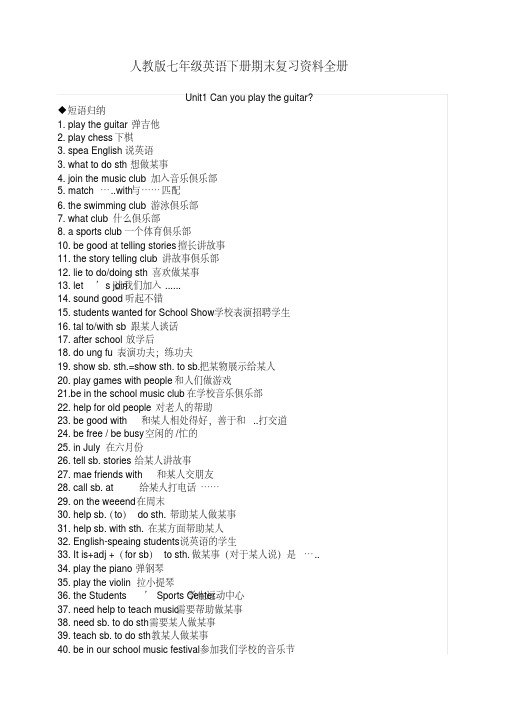
人教版七年级英语下册期末复习资料全册Unit1 Can you play the guitar?◆短语归纳1. play the guitar 弹吉他2. play chess 下棋3. spea English 说英语3. what to do sth 想做某事4. join the music club 加入音乐俱乐部5. match…..with 与……匹配6. the swimming club 游泳俱乐部7. what club 什么俱乐部8. a sports club 一个体育俱乐部10. be good at telling stories 擅长讲故事11. the story telling club 讲故事俱乐部12. lie to do/doing sth 喜欢做某事让我们加入......13. let’s join14. sound good 听起不错15. students wanted for School Show 学校表演招聘学生16. tal to/with sb 跟某人谈话17. after school 放学后18. do ung fu 表演功夫;练功夫19. show sb. sth.=show sth. to sb. 把某物展示给某人20. play games with people 和人们做游戏21.be in the school music club 在学校音乐俱乐部22. help for old people 对老人的帮助和某人相处得好,善于和..打交道23. be good with… 24. be free / be busy 空闲的/忙的25. in July 在六月份26. tell sb. stories 给某人讲故事和某人交朋友27. mae friends with… 给某人打电话……28. call sb. at …… 29. on the weeend 在周末30. help sb.(to)do sth. 帮助某人做某事31. help sb. with sth. 在某方面帮助某人32. English-speaing students 说英语的学生33. It is+adj +(for sb)to sth. 做某事(对于某人说)是…..34. play the piano 弹钢琴35. play the violin 拉小提琴学生运动中心36. the Students’ Sports Center37. need help to teach music 需要帮助做某事38. need sb. to do sth 需要某人做某事39. teach sb. to do sth 教某人做某事40. be in our school music festival 参加我们学校的音乐节◆用法集萃1. play +棋类/球类下…棋/打…球2. play the +西洋乐器弹/拉…乐器3. be good at doing sth.= do well in doing sth. 擅长做某事4. be good with sb. 和某人相处地好5. need sb. to do sth. 需要某人做某事6. can + 动词原形能/会做某事7. a little + 不可数名词一点儿…加入…俱乐部8. join the…club9. lie to do sth. =love to do sth. 喜欢/喜爱做某事◆典句必背1. —Can you draw? 你会画画吗?是的,我会。
七年级下册英语复习知识点归纳全册人教版

七年级下册英语复习知识点归纳全册人教版Unit 1 - My School- Vocabulary: school subjects, classroom objects, school facilities - Grammar: present simple tense, imperative sentencesUnit 2 - I Love History- Vocabulary: historical events, famous people, time expressions - Grammar: past simple tense, wh-questionsUnit 3 - At a Music Lesson- Vocabulary: musical instruments, musical terms, types of music - Grammar: present continuous tense, adverbs of frequencyUnit 4 - Our Neighborhood- Vocabulary: places in the neighborhood, directions, prepositions of place- Grammar: there is/are, prepositions of locationUnit 5 - Rules and Regulations- Vocabulary: school rules, traffic rules, safety rules- Grammar: should/shouldn't, must/mustn't, imperativesUnit 6 - Jobs- Vocabulary: different professions, job responsibilities, workplace - Grammar: be going to, future plans and predictionsUnit 7 - Food and Nutrition- Vocabulary: types of food, eating habits, health and nutrition- Grammar: present continuous for future, going to for future plansUnit 8 - Our Oldest Friends- Vocabulary: animals, animal characteristics, habitatsUnit 9 - Sports Day- Grammar: past continuous tense, time expressionsUnit 10 - Our Environment- Vocabulary: environmental issues, pollution, conservation - Grammar: present perfect tense, adverbs of frequencyUnit 11 - Shopping Fun- Vocabulary: clothing, accessories, shopping expressions - Grammar: countable and uncountable nouns, some/anyUnit 12 - Festivals and Celebrations- Vocabulary: festivals and celebrations, traditions, customs- Grammar: present perfect vs past simple, question tagsUnit 13 - Travel Time- Vocabulary: modes of transportation, travel destinations, vacation activities- Grammar: will, won't, going to for future plansUnit 14 - Let's Go Camping- Vocabulary: camping equipment, nature, outdoor activities- Grammar: could/may/might, polite requestsUnit 15 - Music and Movies- Vocabulary: music genres, film genres, entertainment- Grammar: so/such, too/enough以上是七年级下册英语复习的知识点全册归纳。
- 1、下载文档前请自行甄别文档内容的完整性,平台不提供额外的编辑、内容补充、找答案等附加服务。
- 2、"仅部分预览"的文档,不可在线预览部分如存在完整性等问题,可反馈申请退款(可完整预览的文档不适用该条件!)。
- 3、如文档侵犯您的权益,请联系客服反馈,我们会尽快为您处理(人工客服工作时间:9:00-18:30)。
v1.0 可编辑可修改英语七年级下册(人教版)总复习资料一、一般疑问句是以be 动、助动词、情态动词开头,用yes 或no来回答的句子。
陈述句改为一般疑问句规则如下:Ⅰ. 当句子中含有be 动词(is, am, are)时,把be动词提到句首,主语是第一人称时要改为第二人称。
如:I am a boy. →Are you a boy我是一个男孩。
你是一个男孩吗you are a teacher. →Are you a teacher你是一个老师。
你是一个老师吗He is doing homework. →Is he doing homework 他正在做家庭作业。
他正在做家庭作业吗Ⅱ. 当句子中含有情态动词(如can)时,把情态动词提到句首,主语是第一人称时要改为第二人称。
You can speak English. →Can you speak English 你会讲英语。
你会讲英语吗I can dance. →Can you dance我会跑舞。
你会跳舞吗Ⅲ. 当句子中谓语动词是实义动词时,应在句子前加助动词do或does,如果是过去时态,则应当加did 。
疑问句中谓语动词一律用动词原形。
You speak Chinese. →Do you speak Chinese你讲中文。
你讲中文吗He likes English. →Does he like English他喜欢英语。
他喜欢英语吗He went to the movies. →Did he go to the movies 他去看了电影。
他去看了电影吗二、特殊疑问句(特殊疑问词+一般疑问句语序)用特殊疑问代词Who、Whose、What、Which或疑问副词When、Where、Why、How引导的疑问句。
1. What is your name 你叫什么名字2. Who is he 他是谁3. Whose pen is red 谁的钢笔是红色的4. Which is your pen 哪支钢笔是你的5. Where are you from 你来自哪里6. When is your birthday 你什么时候生日7. Why do you like koalas 你为什么喜欢树袋熊8. How is the weather 天气怎么样三、选择疑问句(一般疑问词+or+可选择部分)其回答是完整句子或其省略式。
1. Do you like apples or pears 你喜欢苹果还是梨子I like apples. / Apples. 我喜欢苹果。
/ 苹果。
2. Is it red or green 它是红色的还是绿色的It is red . / Red. 它是红色的。
/ 红色。
Unit 1一、be from 来自于=come fromI am from China. = I come from China.我来自中国。
He is from China. = He comes from China.v1.0 可编辑可修改他来自中国。
My pen pal is from China. = My pen pal comes from China. 我的笔友来自中国。
1. 把上面三组句子改为否定句①含有be 动词的,直接在be 动词后加not②含有实义动词的,要借助动词do 的否定形式构成否定句,即在实义动词前加don't。
如果是第三人称单数则加doesn't,如果是过去式加didn't,动词要还原。
以上三组句子的否定句为:I am not from China. = I don't come from China. He isn't from China. = He doesn't come from China.My pen pal isn't from China. = My pen pal doesn't come from China. 我的笔友不是来自中国。
2. 以上三组句子的一般疑问句及其回答为:①把be动词提到句首,是第一人称的要改为第二人称。
Are you from China Yes, I am. / No, I am not. Is he from China Yes, he is. / No, he isn't. Is you pen pal from China Yes, he (she) is ./ No, he (she) is.②含实义动词的,借助动词do完成,第三人称单数用does.Do you come from China Yes, I do. / No, I don't. Does he come from China Yes, he does. / No, he doesn't.Does your pen pal come from China Yes, he (she) does. / No, he (she) doesn't.3. 就以上三组陈述句画线部分(China)提问即写出三组特殊疑问句(特殊疑问词+一般疑问句语序)China 为地名,所以特殊疑问词用“Where”Where are you from = Whre do you come from Where is he from = Where does he come from Where is your pen pal from = Where does your pen pal from 你的笔友来自哪里二、live 居住实义动词,表示居住在某地,其后面要加介词in. 如:I live in China. 我住在中国。
He lives in China. 他住在中国。
My pen pal lives in China. 我的笔友住在中国。
1. 以上三个句子的否定句为(实义动词要借助助动词do完成否定句和疑问句):I don't live in China .He doesn't live in China .My pen pal doesn't lives in China .2. 上面三个句子的一般疑问句及其答语为:Do you live in China Yes, I do. / No, I don't. Does he live in China Yes, he does./No, he doesn't.Does your pen pal live in China Yes, he (she) does. / No, he (she) doesn't.v1.0 可编辑可修改3. 就画线部分(in China)提问,及其特殊疑问句(特殊疑问词+一般疑问句语序)。
因in China 为地方,所以用“Where”提问Where do you liveWhere does he liveWhere does you pen pal live三、speak 讲,说实义动词,其后一般接某种语言I speak Chinese. 我讲中文。
He speaks Chinese. 他讲中文。
My pen pal speaks Chinese. 我的笔友讲中文。
1. 其否定句为:I don't speak Chinese.He doesn't speak Chinese.My pen pal doesn't speak Chinese.2. 其一般疑问句及其答语为:Do you speak Chinese Yes, I do. / No, I don't. Does he speak Chinese Yes, he does. / No, he doesn't.Does your pen pal speak Chinese Yes, he (she) does. / No, he (she) doesn't.3. 就画结部分(Chinese)提问因Chinese为语言,所以用“What language(什么语言)”来提问What language do you speakWhat language does he speakWhat language does your pen pal speakUnit 2一、“There be”句型“There is / are+某物/某人+某地/某时”表示“某地/某时有某物/某人。
”(某物/某人,单数用is,复数用are)。
如:There is a hotel on the street. 在街上有一个旅馆。
其否定句为:There isn't a hotel on the street.其一般疑问句为:Is there a hotel on the street 其答语为:Yes , there is. / No, there isn't.其一般疑问句可用于问路二、表示方位的句子1. The hotel is on Center Street. (on,在……上面)旅馆在中心大街上。
2. The hotel is next to the post office. (next to,在……旁边)旅馆在邮局的旁边。
3. The hotel is in front of the post office.(in front of,在……前面)旅馆在邮局的前面。
4. The hotel is behind the post office.(behind,在……后面)旅馆在邮局的后面。
5. The hotel is across from the post office.(across from,在……对面)旅馆在邮局的对面。
6. The hotel is between the post office and the library. (between ... and ... 在……与……之间)旅馆在邮局和图书馆之间。
就以上句子的画线部分提问:v1.0 可编辑可修改Where is the hotel 旅馆在哪里(问路的另一句型)三、指路用语go straight 直走go down / along 沿着……走turn left / right 向左/右转go through 穿过the way to ... 去……的路pass 经过take a taxi 乘出租车arrive at / in 到达……Unit 3一、提出建议的句型之一Let's do sth. (Let's = Let us,do表示动词原形)让我们做某事。
